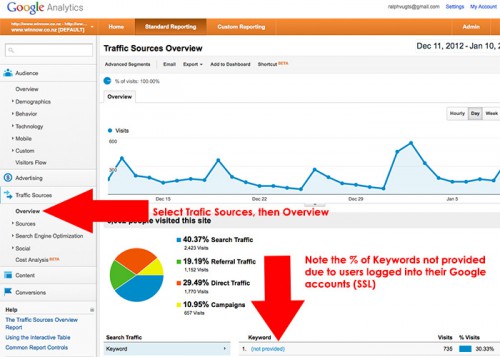Have you been optimising your latest blog articles in the hope to increase your organic traffic from Google? Like any good SEO’er you will be keeping tabs on what keywords you rank for via Google Analytics and patting yourself on the back when more and more keywords pop into that list.
Unfortunately, a few months ago, Google announced that it would begin encrypting search queries for users who were logged in to their Google accounts.
Basically this means that visits from organic searches no longer included information about each individual query, but instead showed "not provided" as the referring keyword.
**Update** Checkout our new article on: How to get (not provided) Google Analytics Keywords >>
In the screenshot below you will notice that just over 30% of the organic traffic from google has been grouped as (not provided). I have read a few articles that this stat is steadily increasing (up to 40% according to CMS Wire) as more and more Internet users start using Gmail and Chrome services. (Approx 350 million Gmail users + 200 million Chrome users currently and growing fast!).

The Ramifications of (Not Provided) Keywords
One of the biggest benefits of running digital campaigns is that you can measure success by digging into your analytics. This is slowly being eroded by these latest Google tweaks. These keywords were a great source of info when it came to planning out SEO campaigns, as often you would discover keywords you had never thought of via this data. You could then build on this with more related content to help establish those keyword phrases even further.
Marketers now can not:
- Effectively track SEO for particular search terms and match them to conversion rates, leads & revenue.
- Use referrer data to personalise the user experience.
- Rank website visitors and leads based on their referring keyword.
But Marketers can:
- Measure overall SEO performance and report on return on investment.
- Keep blogging / producing optimised content to keep getting more traffic from Google
At the end of the day, none of these changes prevent marketers from adopting SEO best practices, however, it will be harder to measure their effectiveness.

 Back to blog
Back to blog